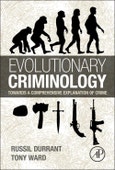In our attempts to understand crime, researchers typically focus on proximate factors such as the psychology of offenders, their developmental history, and the social structure in which they are embedded. While these factors are important, they don't tell the whole story. Evolutionary Criminology: Towards a Comprehensive Explanation of Crime explores how evolutionary biology adds to our understanding of why crime is committed, by whom, and our response to norm violations. This understanding is important both for a better understanding of what precipitates crime and to guide approaches for effectively managing criminal behavior.
This book is divided into three parts. Part I reviews evolutionary biology concepts important for understanding human behavior, including crime. Part II focuses on theoretical approaches to explaining crime, including the evolution of cooperation, and the evolutionary history and function of violent crime, drug use, property offending, and white collar crime. The developmental origins of criminal behavior are described to account for the increase in offending during adolescence and early adulthood as well as to explain why some offenders are more likely to desist than others. Proximal causes of crime are examined, as well as cultural and structural processes influencing crime. Part III considers human motivation to punish norm violators and what this means for the development of a criminal justice system. This section also considers how an evolutionary approach contributes to our understanding of crime prevention and reduction. The section closes with an evolutionary approach to understanding offender rehabilitation and reintegration.
Please Note: This is an On Demand product, delivery may take up to 11 working days after payment has been received.
Table of Contents
1. Criminology and Evolutionary Theory
Part 1: The Evolutionary Framework
2. Evolutionary Theory and Human Evolution
3. Evolutionary Behavioral Science
4. Levels of Analysis and Explanations in Criminology
Part 2: Explaining Crime
5. The Evolution of Altruism, Cooperation, and Punishment
6. Distal Explanations: Adaptations and Phylogeny
7. Development
8. Proximate Explanations: Individuals, Situations, and Social Processes
9. Social Structural and Cultural Explanations
Part 3: Responding to Crime
10.Punishment, Public Policy, and Prevention
11.The Rehabilitation and Reintegration of Offenders
12.Looking Forward from the Perspective of the Past








